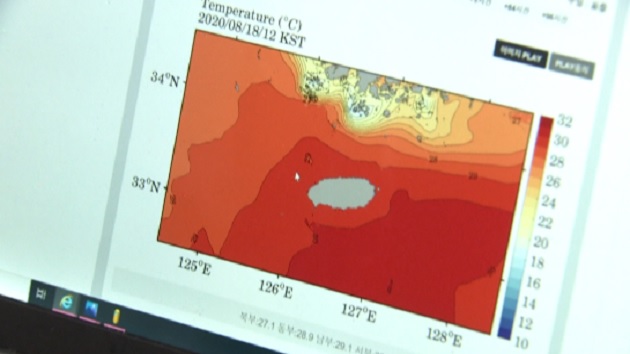
Following the longest rainy season on record, the waters of Jeju Island have become warmer as the heat wave continues. The ocean warming is expected to last until the end of this month.
The possible inflow of diluted seawater from China is also posing a threat to the island’s fishing ground.
Mike Laidman reports.
This research vessel, run by the Jeju Marine Research Center, is getting ready to set sail from (위미) Wimi Port.
The ship will measure the water temperature around Jeju Island to better predict sea water changes.
The temperature of the water, measured one meter below the surface, is taken with specialized equipment.
The water temperature near (위미) Wimi Port is currently around 28 degree celsius - 2 to 3 degrees higher than during a typical summer.
A satellite image taken by the Jeju Marine Research Center shows that the temperature of some coastal waters is in excess of 28 degrees. A warm water watch has been in effect since last week.
Computer simulations predict that the temperature of the ocean to the south of Jeju Island will exceed 30 degrees this week, and that the alert will be raised to a warning.
This detailed research on not only water temperature but also salinity is being made as concerns that the possible inflow of diluted seawater from China could pose a threat to local fishing grounds, alongside the warmer water.
The Jeju Marine Research Center has expanded its area of investigation to as far as 200 kilometers away, to Jeju’s southwest.
They are checking the temperature and salinity on a daily basis to see if, and how, any small changes could impact local fishing grounds.
If ocean water temperatures exceed 26 degrees, the amount of dissolved oxygen drops. This can kill farmed flatfish and hinders seaweed growth.
About 1.2 million flatfish have died over the past three years from high water temperatures at about 60 Jeju fish farms, amounting to some 3 billion won in losses.
The province is encouraging fish farmers to buy disaster insurance to offset their expected financial damage.
With low-salinity water from the East China Sea expected to flow into Jeju’s oceans, this, coupled with unusually high ocean temperatures, means that this is a critical time for Jeju’s marine health.
Mike Laidman, KCTV





